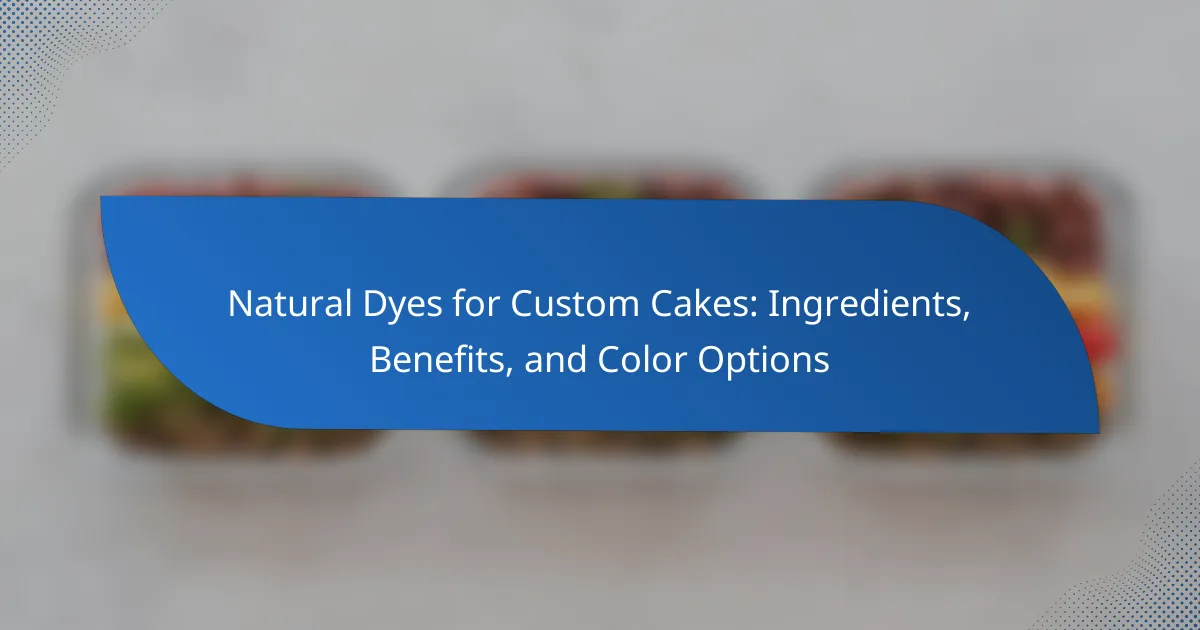Custom cake flours are specialized baking ingredients formulated for specific cake recipes, often blended to achieve optimal textures and flavors. These flours include various types of wheat and may incorporate additional ingredients like starches, which enhance moisture retention. Common types of custom cake flours are all-purpose flour, cake flour, and specialty flours, each with distinct protein content that affects the final product’s texture. The benefits of using custom cake flours include improved rise, tenderness, and flavor in cakes, allowing bakers to tailor their baked goods to specific preferences and dietary needs. This article will explore the different types of custom cake flours, their benefits, and the best practices for their use in baking.

What are Custom Cake Flours?
Custom cake flours are specialized flours tailored for specific cake recipes. They are often blended to achieve desired textures and flavors. These flours can include various types of wheat and additional ingredients. For example, cake flour is typically lower in protein than all-purpose flour. This lower protein content results in a softer, lighter cake. Custom blends may also incorporate starches for moisture retention. Bakers often use these flours to enhance the quality of their baked goods. The use of custom cake flours can lead to improved rise and tenderness in cakes.
How do Custom Cake Flours differ from regular flours?
Custom cake flours differ from regular flours primarily in their protein content and milling process. Custom cake flours typically have lower protein levels, usually around 7-9%. This lower protein content results in a finer texture and lighter crumb in baked goods. Regular flours, such as all-purpose flour, have higher protein levels, approximately 10-12%.
The milling process for custom cake flours is also more refined. This refinement contributes to their ability to absorb liquid and fat differently. Custom cake flours often include added starches to enhance tenderness. These characteristics make them ideal for delicate cakes like sponge or chiffon.
In contrast, regular flours are versatile and suitable for a wider range of baked goods, including bread and cookies. The differences in protein content and milling techniques significantly affect the final texture and structure of the baked products.
What are the unique properties of Custom Cake Flours?
Custom cake flours have unique properties that differentiate them from standard flours. They are often milled from specific wheat varieties, resulting in lower protein content. This low protein content helps create a tender crumb in cakes. Custom cake flours may also have additional modifiers, such as starches, to enhance texture. These flours are designed to absorb moisture differently, leading to improved cake moisture retention. Their unique particle size allows for better aeration during mixing. This results in cakes that rise well and have a light, fluffy texture. Custom cake flours can be tailored for specific cake types, such as sponge or pound cakes, ensuring optimal performance.
How do the milling processes affect Custom Cake Flours?
Milling processes significantly affect Custom Cake Flours by determining their texture and protein content. Different milling techniques, such as stone milling and roller milling, produce flours with varying characteristics. Stone milling retains more bran and germ, leading to a coarser texture. Roller milling produces a finer flour by separating the endosperm from the bran and germ. The protein content in the flour influences the cake’s structure and moisture retention. Higher protein flours can create denser cakes, while lower protein flours yield lighter textures. Research indicates that flour milled with lower protein levels, around 7-9%, is ideal for cakes. This specific milling process ensures a soft crumb and desirable rise in baked goods.
Why are Custom Cake Flours important in baking?
Custom cake flours are important in baking because they enhance the texture and structure of cakes. These flours are specifically milled to produce a fine grain, which results in a lighter and fluffier cake. The protein content in custom cake flours is lower than all-purpose flour, allowing for a tender crumb. This characteristic is vital for delicate cakes like chiffon or sponge cakes. Additionally, custom cake flours often contain added starches that improve moisture retention. This helps prevent cakes from drying out during baking. Many professional bakers prefer custom cake flours for consistent results in cake quality. Their formulation can be tailored for specific cake types, ensuring optimal performance.
What role do Custom Cake Flours play in texture and flavor?
Custom cake flours significantly influence the texture and flavor of baked goods. They are specifically formulated to provide desired characteristics in cakes. These flours often have varying protein contents, which affect gluten development. Lower protein flours yield a tender, soft crumb. Higher protein flours can create a denser texture.
Additionally, custom cake flours may include additives like starches or flavor enhancers. These additives can further enhance moisture retention and flavor complexity. For instance, cake flour typically has a finer grind, contributing to a lighter texture.
Research indicates that the right flour choice can improve overall cake quality. A study by the University of California found that flour type directly correlates with cake volume and texture. This demonstrates the importance of custom cake flours in achieving desired baking results.
How do Custom Cake Flours influence baking results?
Custom cake flours significantly influence baking results by altering texture, moisture, and flavor. These flours are often milled from specific grains or blends, designed for particular baking needs. For instance, cake flour typically has a lower protein content, resulting in a tender crumb. This lower protein level leads to less gluten formation, which is crucial for light and airy cakes.
Furthermore, custom blends can incorporate starches or additives that enhance moisture retention. This results in a softer, more flavorful cake. Some custom flours are designed to absorb more liquid, impacting the overall batter consistency.
Research shows that using the right flour can lead to a 20% increase in cake volume. This demonstrates the importance of flour choice in achieving desired baking outcomes. Thus, custom cake flours are essential for achieving specific baking results.

What are the different types of Custom Cake Flours?
Custom cake flours come in several types, each designed for specific baking needs. The most common types include all-purpose flour, cake flour, and specialty flours. All-purpose flour has a moderate protein content, making it versatile for various baked goods. Cake flour has a lower protein content, resulting in a tender crumb ideal for cakes. Specialty flours, such as gluten-free or almond flour, cater to specific dietary requirements. Each flour type impacts the texture and structure of the final product. For example, cake flour produces lighter, fluffier cakes compared to all-purpose flour.
What are the common types of Custom Cake Flours available?
Common types of custom cake flours include all-purpose flour, cake flour, and specialty flours. All-purpose flour is versatile and used for various baked goods. Cake flour has a lower protein content, resulting in a lighter texture in cakes. Specialty flours, such as almond flour and coconut flour, cater to specific dietary needs. Almond flour is gluten-free and adds a nutty flavor. Coconut flour is also gluten-free and highly absorbent. Each type offers unique properties that affect baking outcomes. These flours are selected based on the desired texture and flavor of the final product.
How does each type of Custom Cake Flour affect baking?
Custom cake flour types significantly influence baking outcomes. All-purpose flour has a higher protein content, leading to denser cakes. Cake flour, with lower protein, results in lighter, fluffier textures. Self-rising flour contains baking powder, which adds leavening, creating a more airy structure. Gluten-free flour blends substitute traditional flours, affecting texture and moisture retention. Each flour type contributes distinct attributes to the final product, impacting rise, crumb, and overall flavor. For example, cakes made with cake flour often have a tender crumb due to its finer texture. Adjusting flour types can optimize cake quality based on desired characteristics.
What are the best uses for each type of Custom Cake Flour?
All-purpose custom cake flour is best used for general baking needs. It provides a balanced protein content for versatile recipes. This type works well for cakes, cookies, and muffins.
Low-protein custom cake flour is ideal for delicate cakes. It creates a tender crumb in sponge cakes and angel food cakes. This flour is perfect for recipes requiring a light texture.
High-protein custom cake flour is suited for denser baked goods. It is great for pound cakes and brownies. The higher protein content helps achieve a firmer structure.
Self-rising custom cake flour is convenient for quick recipes. It contains added leavening agents. This flour is excellent for biscuits and pancakes, requiring no additional leavening.
Gluten-free custom cake flour is essential for gluten-sensitive baking. It allows for cake recipes without gluten. This flour works well in various gluten-free cake mixes.
What specialized Custom Cake Flours exist for specific needs?
Specialized custom cake flours exist to cater to various baking needs. Gluten-free cake flour is designed for those with gluten intolerance. Almond flour provides a nutty flavor and is low in carbohydrates. Coconut flour is high in fiber and absorbs moisture well. Cake flour blends are often tailored for specific dietary restrictions. Each type enhances texture and flavor in baked goods. These flours are available in specialty stores and online. Their unique properties make them suitable for diverse recipes.
How do gluten-free Custom Cake Flours differ from traditional options?
Gluten-free custom cake flours differ from traditional options primarily in their ingredient composition. Traditional cake flours are usually made from wheat, which contains gluten. Gluten provides elasticity and structure to baked goods. In contrast, gluten-free flours are made from alternative grains or starches, such as almond flour, coconut flour, or rice flour. These alternatives do not contain gluten, requiring different binding agents or combinations to achieve similar textures.
For example, many gluten-free blends include xanthan gum or guar gum to mimic the properties of gluten. Additionally, gluten-free flours often have varied flavors and nutritional profiles compared to traditional flours. This can affect both taste and the final texture of the cake. Gluten-free options may yield denser cakes due to the absence of gluten’s structural properties.
Research shows that gluten-free baking requires adjustments in recipes to achieve desired results. The differences in composition and resulting texture are crucial for bakers to consider when choosing flour types.
What are the benefits of using organic Custom Cake Flours?
Organic custom cake flours offer multiple benefits for baking. They are made from high-quality, non-GMO grains. This ensures that no harmful pesticides or chemicals are present. Organic flours retain more nutrients compared to conventional options. They often provide better flavor and texture in baked goods. Additionally, organic ingredients can lead to a healthier end product. Research indicates that organic foods may have higher antioxidant levels. This makes organic custom cake flours a superior choice for health-conscious consumers.

What are the benefits of using Custom Cake Flours?
Custom cake flours provide several benefits for baking. They are specifically formulated to enhance texture and flavor in cakes. These flours often have a lower protein content than all-purpose flour. This results in lighter, fluffier cakes with a tender crumb. Custom cake flours may also include added ingredients like starches or leavening agents. These additions can improve moisture retention and extend shelf life. Using custom cake flours allows for better control over the final product’s characteristics. Bakers can achieve desired results tailored to specific recipes or preferences.
How do Custom Cake Flours enhance baking quality?
Custom cake flours enhance baking quality by providing a tailored protein content and texture suitable for specific recipes. These flours are designed to yield lighter, fluffier cakes with improved crumb structure. For instance, cake flour typically has a lower protein content than all-purpose flour, which results in less gluten formation. This characteristic leads to a tender and delicate cake. Additionally, custom blends can incorporate starches or leavening agents that further optimize the baking process. Research indicates that the right flour blend can significantly affect moisture retention and overall flavor. Therefore, utilizing custom cake flours can elevate the final product’s quality and consistency in baking.
What are the advantages of using Custom Cake Flours for specific recipes?
Custom cake flours offer tailored properties that enhance specific recipes. They can provide the ideal protein content for desired textures. For example, low-protein flours yield lighter cakes, while high-protein flours create denser textures. Custom blends can also optimize moisture retention and flavor profiles. This allows bakers to achieve consistency across batches. Additionally, specific cake flours can improve rise and crumb structure. Overall, using custom cake flours leads to better results in baking.
How do Custom Cake Flours support dietary restrictions?
Custom cake flours support dietary restrictions by providing tailored options for various needs. These flours can be gluten-free, nut-free, or vegan, accommodating individuals with specific dietary requirements. For instance, gluten-free custom cake flours are made from alternative grains like almond or coconut, ensuring safety for those with celiac disease. Additionally, some custom blends use ingredients like tapioca or rice flour, which are suitable for gluten-sensitive consumers.
Vegan custom cake flours eliminate eggs and dairy, allowing those with lactose intolerance or egg allergies to enjoy baked goods. These flours can incorporate plant-based binders like flaxseed or chia seeds. Custom cake flours also enable the creation of low-sugar or low-carb options, appealing to those managing diabetes or following ketogenic diets.
By offering a range of specialized ingredients, custom cake flours allow bakers to create delicious treats that meet diverse dietary needs. This adaptability enhances inclusivity in baking, ensuring that everyone can enjoy cake regardless of their dietary restrictions.
What are the economic benefits of using Custom Cake Flours?
Custom cake flours provide significant economic benefits by reducing ingredient costs and improving production efficiency. These flours are often tailored to specific recipes, which can minimize waste and enhance yield. By using custom blends, bakeries can achieve consistent quality, leading to higher customer satisfaction and repeat business. Additionally, custom flours can lower the need for multiple types of flour, streamlining inventory management. This consolidation can lead to bulk purchasing discounts, further reducing overall costs. Studies show that businesses utilizing specialized ingredients often see a return on investment through increased sales and reduced operational expenses.
How do Custom Cake Flours compare in cost-effectiveness?
Custom cake flours are often more cost-effective than standard flours for specific baking needs. They are designed to enhance texture and flavor, which can lead to higher quality baked goods. This can result in fewer wasted ingredients and less need for additional flavoring agents. According to a study published in the Journal of Food Science, custom flours can improve baking performance, reducing the overall cost per unit of high-quality cakes. Additionally, while the initial price may be higher, the long-term savings from reduced ingredient use and improved customer satisfaction can offset the upfront costs.
What value do Custom Cake Flours add for professional bakers?
Custom cake flours provide professional bakers with tailored properties for specific baking needs. These flours are often formulated to achieve optimal texture and flavor in cakes. They can enhance moisture retention, resulting in softer, more tender cakes. Custom blends may also improve rise and structure, leading to better volume and stability.
Bakers can select flours based on desired outcomes, such as lightness or density. For instance, a cake flour with lower protein content yields a finer crumb. Additionally, custom cake flours can include additives like starches or enzymes to further enhance performance.
Using these specialized flours can lead to more consistent results across different batches. This consistency is crucial for professional bakers who aim to maintain quality for their clientele. Overall, custom cake flours allow bakers to elevate their creations with precision and creativity.
What tips should I consider when using Custom Cake Flours?
When using custom cake flours, consider the protein content. Different flours have varying protein levels, affecting cake texture. For lighter cakes, use lower protein flours like cake flour. For denser cakes, higher protein flours like bread flour are suitable. Measure flour accurately using the spoon and level method. This prevents excess flour, which can lead to dry cakes. Adjust liquid ingredients based on the flour type; denser flours may absorb more liquid. Experiment with blending different flours for unique textures and flavors. Lastly, always sift the flour before use to aerate it and remove lumps.
Custom cake flours are specialized flours designed to enhance the texture and flavor of specific cake recipes. They typically have lower protein content than all-purpose flour, resulting in lighter, fluffier cakes with a tender crumb. This article explores the various types of custom cake flours, their unique properties, and how they differ from regular flours, as well as their importance in baking. Additionally, it covers the benefits of using custom cake flours, including their role in supporting dietary restrictions and improving baking quality, while also discussing economic advantages for professional bakers.



